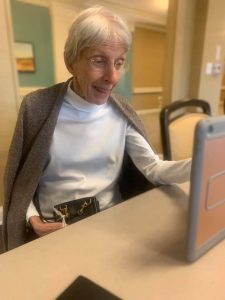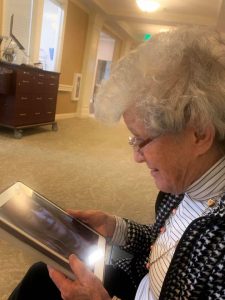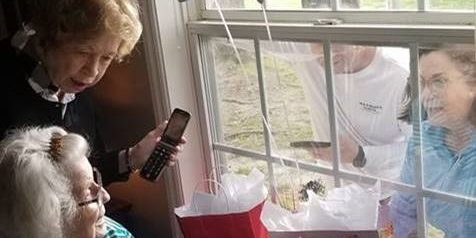Shared with permission from Spring Arbor Wilson
Keeping in touch with your loved one who lives in a Care Community
Social distancing and not visiting your loved one living in a Care Community can be extremely difficult. Some family members are used to visiting their loved ones every day.
They were often the primary caregiver at home before the person moved into the Care Community. Then their role changed once that move was made. Now, their primary role has changed again, the hardest change yet.
And for loved ones whose family member is non-verbal, daily or even weekly visitation is often how they can demonstrate their love.
COVID 19 has changed all of that.
So what can be done for family and friends to stay in touch?
We have reached out to a variety of Care Communities across North Carolina to see how they are approaching this challenge. These communities include Independent Living, Assisted Living, Skilled Nursing, and also Adult Day programs.
- First, it is important that the family communicate with the Care Community what technology they have access to and know how to use. On the flip side of that, the Community can reach out to each family and ask what technology works for them. In this day and age, we do have a lot of options. Of course the daily phone call can happen, but sometimes residents in these Communities have a difficult time using the phone.
- Additional tools might include video chats, emails, sharing photos, Face Time, Skype, Facebook Messenger, and a variety of other choices.
- We have seen photos online of families bringing chairs to sit and visit outside of their loved one’s window. This can be a great alternative, however, do check with the Community first to be certain it is alright. We don’t want to infringe on another resident’s right to privacy in our efforts to connect.



Shared with permission from Waltonwood Lake Boone
Here we share some of the “best practices” we have found, we would love to hear how you are approaching this challenge, too.
- Administrators and Executive Directors sending emails three times a week to families so they are updated with the latest happenings.
- All Community Managers call families at least weekly with updates specifically on their loved one and to see how the family is coping.
- Families have been encouraged to make appointments to speak to loved ones on the phone or via video chats, with specific staff tasked to be certain these appointments are kept.
- For residents with low vision or other communication issues, some communities are connecting computers to large screen TV’s so that the video chats are on larger screens than a phone or tablet.
- Communities have staff being the legs and hands for families who aren’t present. For example, if a daughter always watered mom’s plants during her visits, a staff member now does that and lets the family know when it’s done.
- Most Communities have Facebook pages. In the past they might not have posted to them very often. With new visitation policies these pages have become a window in the Communities, helping families to see what is happening on a daily basis.
- Teams have taken up Skyping or Face timing from resident’s rooms. This way families not only see their loved one, they also can see if the room is clean. It gives them a visual confirmation that social distancing is happening and they are also able to hear that things are happening in the Community.
- Several communities are keeping journals for the residents. Some are very brief and shared through email, others are simply a photo sent daily. Others are using apps to stay connected.
- While there are many journaling apps available, one community in particular mentioned the One Day for Senior Living app. Through it entries and videos can be made that not only help with the current situation, but will also be keepsakes for a lifetime.
- Even though most Adult Day programs have closed, some shared that they are keeping in constant contact with their participants and families. They send an email at least weekly, have set up Zoom calls so that participants can see each other, and share daily uplifting caregiving quotes. They are also sending weekly activity suggestion based on their participants’ specific interests and abilities.
It is a difficult time for everyone and we are all especially concerned for our seniors. Those that live in Care Communities often feel isolated from family anyway. Social distancing and no or limited visitation have exaggerated those feelings. However, thanks to the direct care workers and other team members who continue to work daily, often pulling longer shifts than normal to keep their residents safe, we see that families can keep in touch.
If you are stressed or concerned about not being able to be with your loved one, please don’t hesitate to reach out and talk with someone. Call us at Dementia Alliance, (919) 832-3732, so that we can connect you with online support groups, social workers, and many other resources to make this time just a little easier.


